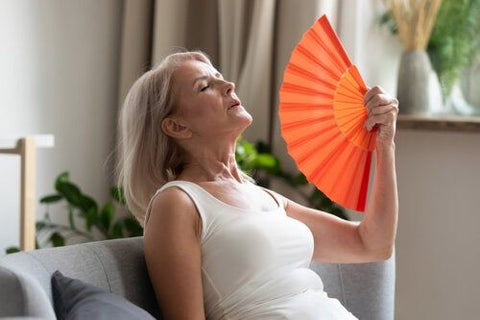Menopause is a natural stage in a woman's life that can bring with it a series of physical and emotional changes that can significantly affect mental health.
Declining levels of estrogen, the main female sex hormone, can lead to irritability, anxiety, depression, mood swings and other difficult-to-manage emotions.
A topic that stands out today is menopause and depression.
“Depression affects 25% of women who go through menopause. The cause at this stage is the same: a drop in estrogen levels, but no one talks about it. At work, the loss of mental agility, forgetting certain things or not realizing others makes women feel, without any apparent reason, a lack of efficiency or a mental “slowness” that was not usual in them before, which can increase this depression,” says Rocio Crespo, head of the Gynecology area in the Medical Department of Theramex.
How does menopause affect mental health?
According to the World Health Organization (WHO), up to 70% of women experience some mental health symptoms during menopause . These symptoms can be mild or severe, and can vary in intensity and duration from woman to woman. Some of the most common symptoms include:
- Anxiety: A feeling of excessive restlessness, nervousness, or apprehension.
- Depression: A persistent low mood that negatively affects thoughts, feelings, and behaviors.
- Mood swings: Irritability, sadness, anger or sudden mood swings for no apparent reason.
It is important to note that not all women experience these mental disorders during menopause. The intensity and duration of symptoms vary considerably between individuals, and depend on a number of factors, including genetic predisposition, pre-existing physical and mental health, lifestyle and social support.
What can you do to take care of your mental health during menopause?
While menopause is a natural process, there are different ways to alleviate symptoms and improve mental health during this stage. Here are 5 tips that can help you:
- Keep a positive attitude:
Focusing on the positive aspects of life and engaging in pleasurable activities can have a significant impact on mental wellbeing. Scientific studies have shown that activities such as laughing, listening to music, meditating or reading can increase the release of endorphins in the brain. Endorphins are neurotransmitters that act as natural painkillers, helping to relieve pain and promote a general feeling of wellbeing.
- Surround yourself with people who add to your positive energy rather than take away from it:
The best antidepressant in menopause. The quality of our social relationships can influence our mental health, especially during periods of hormonal change such as menopause. Maintaining positive and supportive relationships can help reduce stress, improve mood and promote a sense of belonging.

- Get enough sleep:
Lack of sleep can aggravate menopausal symptoms and negatively affect mood and overall health. During sleep, the body carries out important repair and restoration processes, including the elimination of toxins. It is recommended that adult women get at least 8 hours of sleep per night to promote good physical and mental health. Implementing sleep hygiene habits, such as establishing a regular sleep schedule and creating a sleep-friendly environment, can be beneficial.
- Avoid alcohol, tobacco and excess caffeine:
These substances can have negative effects on menopausal symptoms and overall health. Alcohol and tobacco can interfere with hormonal balance and increase hot flashes and other symptoms associated with menopause. In addition, too much caffeine can increase irritability, anxiety, and sleep problems. A healthy diet provides the nutrients necessary for the proper functioning of the body and helps maintain a healthy weight. Limiting the consumption of harmful substances can reduce the intensity of some menopausal symptoms and improve the quality of sleep.
- Do physical activity:
During menopause, regular physical activity can be crucial to improving physical and mental health. Exercise promotes the release of endorphins in the brain, alleviating symptoms such as hot flashes and anxiety. It also helps maintain a healthy weight, reduces the risk of chronic diseases such as diabetes and cardiovascular disease, strengthens bones to prevent osteoporosis, and improves overall quality of life.

Remember, menopause doesn't have to be a difficult time to deal with.
With these tips and the help of a mental health professional, you can navigate this stage with confidence and well-being. Seek help if you need it, and don't hesitate to consult with a psychologist for the support and guidance that will help you cope with the changes in a positive way.
Together we can make menopause a positive experience!
If you identify with any of the points in this blog or would like to know more about the topic → read the following blog and find out or take our test.
References:
- What is menopause? (n.d.). National Institute on Aging. Retrieved April 9, 2024, from https://www.nia.nih.gov/menopause/menopause
- (S/f). Childrensmn.org. Retrieved April 9, 2024, from https://www.childrensmn.org/educationmaterials/teens/article/12495/anxiety-disorders/
- Depression . (n.d.). Who.int. Retrieved April 9, 2024, from https://www.who.int/es/news-room/fact-sheets/detail/depression
- Menopause . (n.d.). https://www.cun.es. Retrieved April 9, 2024, from https://www.cun.es/enfermedades-tratamientos/enfermedades/menopausia
- Menopause . (n/a). Who.int. Retrieved April 9, 2024, from https://www.who.int/es/news-room/fact-sheets/detail/menopause
- Mimenza, OC (2016, November 24). Endorphins (neurotransmitters): functions and characteristics . pymOrganization. https://psicologiaymente.com/neurociencias/endorfinas-neurotransmisores
- (S/fb). Sanitas.es. Retrieved April 9, 2024, from https://www.sanitas.es/biblioteca-de-salud/enfermedades-y-trastornos/endocrinas/neurotransmisores
- Importance of personal relationships in reducing stress . (n.d.). Cigna.com. Retrieved April 9, 2024, from https://www.cigna.com/es-us/knowledge-center/hw/importancia-de-las-relaciones-personales-para-ue5160
- Menopause and Sleep Problems: What Can I Do? (n.d.). National Institute on Aging. Retrieved April 9, 2024, from https://www.nia.nih.gov/menopause/menopause-sleep-problems-what-can-i-do
- Roche-Posay, L. (n.d.). What is sleep and why is it important ? Laroche-posay.es. Retrieved April 9, 2024, from https://www.laroche-posay.es/article/que-es-el-sueno-y-por-que-es-importante
- Bibliographic, R. (n.d.). THE IMPACT OF PHYSICAL EXERCISE ON MENOPAUSAL WOMEN . Universidadeuropea.com. Retrieved April 9, 2024, from https://titula.universidadeuropea.com/bitstream/handle/20.500.12880/3184/Marta_Enriquez_Garcia.pdf?sequence=1&isAllowed=y
- Emotional and mental changes in menopause . (n.d.). Tena.es. Retrieved April 9, 2024, from https://www.tena.es/mujer/vivir-con-perdidas-de-orina/menopausia-e-incontinencia/cambios-emocionales-y-mentales-en-la-menopausia
- Health Day News -NYT. (2024, March 6). Does Menopause Affect Mental Health? What a New Study Revealed . infobae. https://www.infobae.com/health/2024/03/06/some-women-escape-the-effects-of-menopause-on-mental-health-according-to-a-study/
- Hospitals, HM (n.d.). What is the mental health of women like during menopause? Retrieved April 10, 2024, from https://www.hmhospitales.com/servicios-al-paciente/servicios-medicos/unidad-de-atencion-psicologica-personalizada/¿cómo-es-la-salud-mental-de-las-mujeres-en-la-menopausia
- Barreiro, A., Alonso Safont, T., Sánchez Calso, A., Durbán Peralías, F.J., & Manget Velasco, S. (1998). Study of psychic morbidity in perimenopause. Diagnostic concordance between a primary care team and its reference mental health center. Primary Care , 21 (9), 613–616. https://www.elsevier.es/es-revista-atencion-primaria-27-articulo-estudio-morbilidad-psiquica-perimenopausia-concordancia-15131
- Bonilla, R. (2022, December 24). 30% of women have anxiety about menopause and this is how it can be avoided . La Razón. https://www.larazon.es/salud/20221227/rfgoqvudq5atpfwxghkznfbg3q.html
- Michel. (2017, March 4). Can menopause cause mood swings? Ymea | Your Ally for Menopause. https://ymea.es/sintomas/cambios-de-humor-menopausia/




Comments (0)
There are no comments for this article. Be the first one to leave a message!